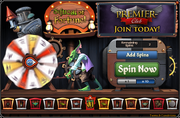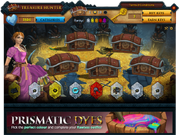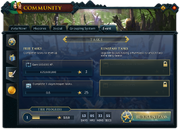Microtransactions (abbreviated as MTX) are a form of monetisation model where players can purchase virtual goods in a game. In RuneScape, this refers to anything that you can purchase with real-world currency that is not a membership subscription.
History[]
2012: The introduction of Squeal of Fortune and Solomon's Store[]

The interface for Squeal of Fortune
The first implementation of microtransactions in RuneScape came in the form of purchasable "spins" for the Squeal of Fortune on 2 April 2012, just over a month after it was released. It provided players daily "spins" on a wheel to receive a magnitude of prizes, including experience lamps and coins.
Jagex added the ability to purchase spins with real-world currency, with transactions being performed through the RuneScape website. They could be bought in bulk - ranging from 10 spins at $4.99 USD to 200 spins at $99.99 USD. There was significant controversy with Squeal of Fortune when the ability to purchase spins was introduced, causing players to accuse Jagex of breaking their own rules on real-world trading, which they previously introduced with the reasoning:
| “ | We want RuneScape to be a game where everyone has the same chance regardless of their wealth in real-life. | ” |
— Jagex, Real World Trading Rule Added
|
Just three months later, on 17 July, Jagex introduced the Solomon's General Store to the game, along with the currency it utilised, RuneCoins. Solomon's Store was significantly more cosmetic-focused than the Squeal of Fortune, but players that wanted to buy from the store had to either earn RuneCoins through playing the Squeal of Fortune or purchasing them with real-world currency. There was less controversy behind the introduction of the store than there was for the Squeal of Fortune, though some were concerned about the increasing number of microtransactions being added to the game.
2013: The introduction of Bonds[]
On 25 September 2013, Jagex introduced bonds to RuneScape as a way to pay for account benefits such as membership using in-game currency. Bonds can be traded on the Grand Exchange, but are initially obtained by players who had purchased them using real-world currency.
The introduction of bonds received a spout of controversy, with players accusing Jagex of destructing the integrity of the game because of the fact that what bonds achieve are an "official" form of real-world trading.
| “ | Bonds were conceived as a way to cripple gold farmers, whose illicit real world trading was damaging the game economy and disrupting gameplay. | ” |
2014: The introduction of Treasure Hunter[]

The Treasure Hunter interface
On 4 February 2014, Treasure Hunter was added to RuneScape as a replacement to the Squeal of Fortune. In a similar fashion to its predecessor, it allowed players to have a random chance at gaining an assortment of items. Spins were replaced with keys, and remained purchasable with real-world currency. There was no shortage of complaints about the activity, which began to ramp up promotions and become more experience and skilling focused in terms of rewards.
A month later, the wealth evaluator was added to RuneScape, allowing players to gain an insight into the wealth that they have in-game. The evaluator requires RuneCoins to purchase, which can only be obtained with real-world currency.
2016-2018: RuneMetrics and Statement on Monetisation[]
On 22 February 2016, Jagex introduced RuneMetrics, allowing players to see stats about their gameplay, including their experience rates per hour and their gold earned per hour. To access in-depth statistics about their gameplay, players must purchase a subscription to RuneMetrics Pro, not included in their membership subscription, for real-world currency.
On 29 March, Jagex announced changes to the Solomon's Store which meant that some items would only become purchasable using RuneCoins. The most notable items that became RuneCoins-only were in-game services, rather than cosmetics, such as bank boosters, additional action bars, and keepsake keys.
In-game events started utilising RuneCoins more, allowing players to get rewards quicker or complete the events quicker by using them. These notably include the seasonal events such as Summer Beach Party and Spring Fayre.
In 2017, Treasure Hunter came under significant fire for the increase in promotions - most notably the Prize Pool promotion. The promotion allowed players to risk losing prizes that they win on Treasure Hunter to gain a chance at getting better ones. A significant number of players raised concern with the promotion, as it added to the gambling aspect of the activity, and called for Jagex to remove it.
Despite acknowledging the issues with the Prize Pool promotion, promotions continued heavily for the next few days until Jagex finally released a statement on monetisation on 23 October.
| “ | While MTX in RuneScape is essential to maintaining our development teams and the content they produce, we believe it can be refined (and the harsher edges smoothed out) without significant dents to income. Rest assured, we certainly won't be pushing it any harder. | ” |
In the statement, Jagex said that the promotion would never return, and toned down the promotions (as well as removing 2nd Chance Tuesday) for the remainder of the year.
2018: RunePass[]

The interface for tasks in RunePass
On 2 July 2018, Jagex released a new event called RunePass which was inspired by games using a similar model such as Fortnite. It featured two prize tracks - a free track and a paid track - and a number of rewards for progressing through the tiers within the tracks. Only four items in total could be obtained by players on the free track, while those who purchased the paid track for 400 RuneCoins received prizes in every tier.
RunePass received some criticism from players who expressed their dislike at the ever-growing number of monetisation models in RuneScape, and the fact that the pass is inspired by free-to-play games, while RuneScape is a subscription-based game.
| “ | (...)this is a test to see if we can pull back from other things like TH [Treasure Hunter]. | ” |

